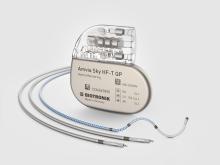What Is a Heart Attack?
A heart attack or myocardial infarction (MI) is a life-threatening emergency requiring immediate medical care. It happens when the blood flow to a section of the heart suddenly stops and the muscle cells do not receive enough oxygen. Usually, a heart attack is caused by a blockage of one or more coronary arteries. Without a blood supply, the heart cannot work properly. Cardiac function is reduced or even fails completely. In the latter case, death may occur suddenly. If only a small section of the heart’s muscle is affected, the heart may be injured but still able to function at a reduced capacity. The longer the heart’s blood circulation is disturbed, however, the higher the risk that muscle cells will die and be replaced by scar tissue. This scar tissue is not able to perform the tasks of the muscle and the heart will never regain its original power and capacity. Sometimes, scar tissue may cause irregular heartbeats because it cannot conduct the electrical impulses that control the heart’s activity. If the heart is severely damaged, even minor stresses may overstrain its capacity, causing a potentially fatal heart attack. It is therefore crucial to find and treat the blockage of the blood flow as quickly as possible.






